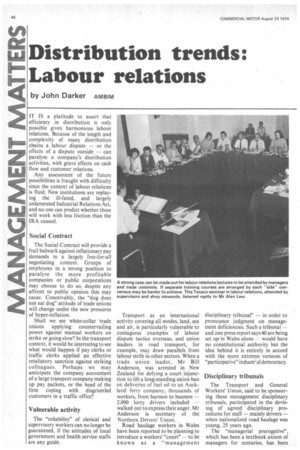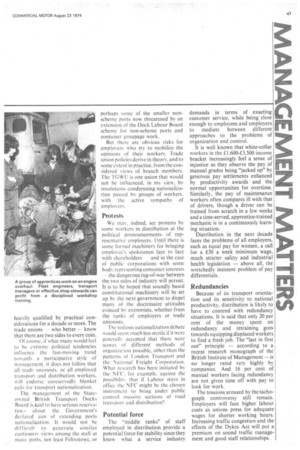Distribution trends: Labour relations
Page 50

Page 51

If you've noticed an error in this article please click here to report it so we can fix it.
by John Darker AMBIM IT IS a platitude to assert that efficiency in distribution is only possible given harmonious labour relations. Because of the length and complexity of many distribution chains a labour dispute — or the effects of a dispute outside — can paralyse a company's distribution activities, with grave effects on cash flow and customer relations.
Any assessment of the future possibilities is fraught with difficulty since the context of labour relations is fluid. New institutions are replacing the ill-fated, and largely unlamented Industrial Relations Act, and no one can predict whether these will work with less friction than the IRA caused.
Social Contract
The Social Contract will provide a z frail bulwark against inflationary pay demands in a largely free-for-all demands in a largely free-for-all negotiating context. Groups of employees in a strong position to paralyse the more profitable companies or public corporations may choose to do so, despite any affront to public opinion this may cause. Conceivably, the "dog does not eat dog" attitude of trade unions will change under the new pressures of hyper-inflation.
Shall we see white-collar trade unions applying countervailing power against manual workers on strike or going slow? In the transport context, it would be interesting to see what would happen if pay clerks or traffic clerks applied an effective retaliatory sanction against striking colleagues. Perhaps we may anticipate the company accountant of a large transport company making up pay packets, or the head of the firm coping with disgruntled customers in a traffic office?
Vulnerable activity
The "reliability" of clerical and supervisory workers can no longer be guaranteed, if the attitudes of local government and health service staffs are any guide. Transport as an international activity covering all modes, land, sea and air, is particularly vulnerable to contagious examples of labour dispute tactics overseas, and union leaders in road transport, for example, may draw parallels from labour strife in other sectors. When a trade union leader, Mr Bill Anderson, was arrested in New Zealand for defying a court injunction to lift a long-standing union ban on deliveries of fuel oil to an Auckland ferry company„ thousands of workers, from barmen to busmen — 2,000 lorry drivers included --walked out to express their anger. Mr Anderson is secretary of the Northern Drivers' Union.
Road haulage workers in Wales have been reported to be planning to introduce a workers' "court" — to be known as a "management disciplinary tribunal" — in order to pronounce judgment on management deficiencies. Such a tribunal — and one press report says 40 are being set up in Wales alone — would have no constitutional authority but the idea behind it is entirely in accord with the more extreme versions of "participative" industr'al democracy.
Disciplinary tribunals
The Transport and General Workers' Union, said to be sponsoring these management disciplinary tribunals, participated in the devising of agreed disciplinary procedures for staff — mainly drivers — when nationalized road haulage was young, 25 years ago.
The "managerial prerogative", which has been a textbook axiom of managers for centuries, has been heavily qualified by practical considerations for a decade or more. The trade unions -who better — know that there are two sides to every coin.
Of course, if what many would feel to be extreme political tendencies influence the fast-moving trend towards a " participative style of management. it does not follow that all trade unionists, or all employed transport and distribution workers, will endorse unreservedly blanket calls for transport nationalization.
The management of the Stateowned British Transport Docks Board is said to have serious reservatiorrs about the Government's declared aim of extending ports nationalization. It would not he difficult to generate similar cautiona fl views among the staff at many ports, not least Felixstowe, or perhaps some of the smaller nonscheme ports now threatened by an extension of the Dock Labour Board scheme for non-scheme ports and container groupage work.
But there are obvious risks for employers who try to mobilize the opinions of their workers. Trade Union policies derive in theory, and to some extent in practice, from the considered views of branch members. The TGWU is one union that would not be influenced, in my view, by resolutions condemning nationalization passed by groups of workers, with the active sympathy of employers.
Protests We may. indeed, see protests by some workers in distribution at the political pronouncements of representative employers. Until there is some formal machinery for bringing employee's spokesmen face to face with shareholders and in the case of public corporations with some body representing consumer interests — the dangerous tug-of-war between the two sides of industry will persist. It is to he hoped that soundly based constitutional machinery will be set up by the next government to dispel many of the doctrinaire attitudes evinced by extremists, whether from the ranks of employers or trade unionists.
The tedious nationalization debate would seem much less sterile if it were generally accepted that there were scores of different methods of organiiation possible, other than the patterns of London Transport and the National Freight Corporation. What research has been initiated by the NFC. for example, against the possibility that if Labour stays in office the WC might he the chosen instrument to bring under public control massive sections of road transport arid distribution?
Potential force
The "middle ranks" of staff employed in distribution provide a potential force for stability since they know what a service industry demands in terms of exacting customer service, while being close enough to employees and employers to mediate between different 111 approaches to the problems of organization and control.
It is well known that white-collar workers in the EL600-£3,500 income bracket increasingly feel a sense of injustice as they observe the pay of manual _grades being "jacked up" by generous pay settlements enhanced by productivity awards and the normal opportunities for overtime. Similarly, the pay of maintenance workers often compares ill with that of drivers, though a driver can be trained from scratch in a few weeks and a time-served, apprentice-trained mechanic is in a continuously learning situation.
Distribution in the next decade faces the problems of all employers, such as equal pay for women, a call for a £30 a week minimum wage, much stricter safety and industrial health legislation — above all, the wretchedly insistent problem of pay differentials.
Redundancies
Because of its transport orientation and its sensitivity to national productivity, distribution is likely to have to contend with redundancy situations. It is said that only 20 per cent of the money spent on redundancy and retraining goes towards equipping displaced workers to find a fresh job. The "last in first out" principle — according to a recent research monograph of the British Institute of Management — is no longer rated very highly by companies. And 16 per cent of manual workers facing redundancy are not given time off with pay to look for work.
The tensions aroused by the tachograph controversy still remain. Employers will face higher labour costs as unions press for adequate wages for shorter working hours. Increasing traffic congestion and the effects of the Dykes Act will put a premium on sound traffic management and good staff relationships.






























































































